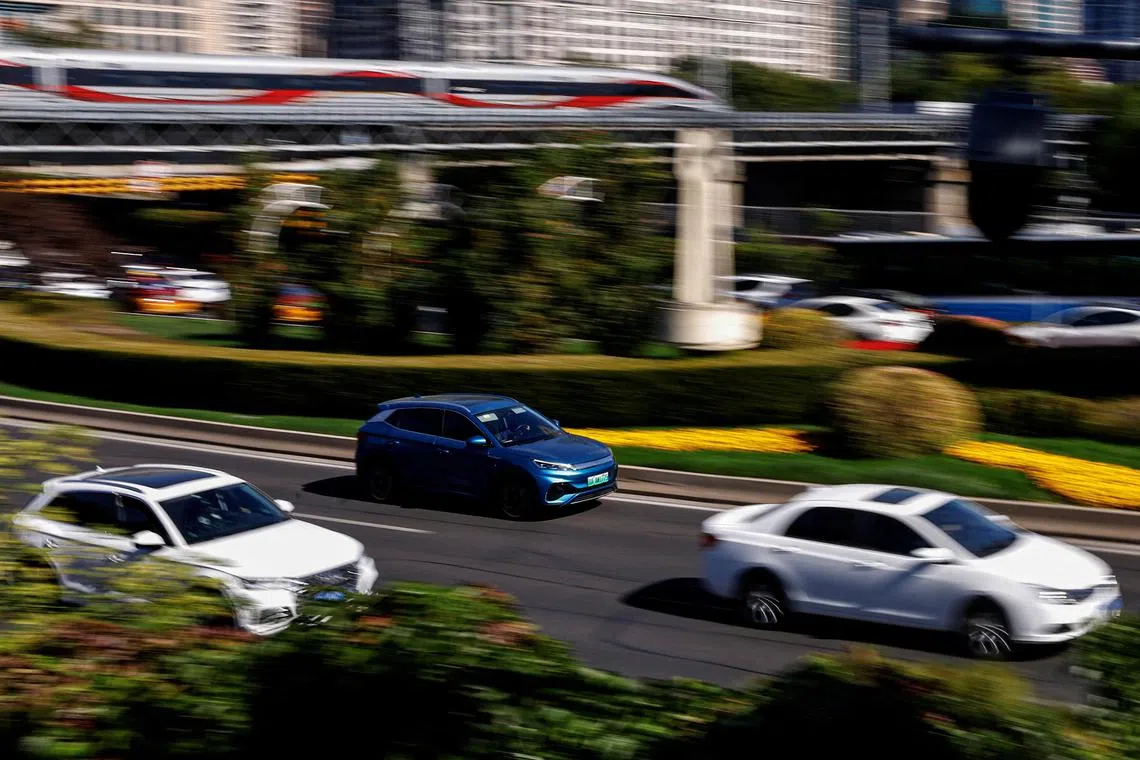Volkswagen, BMW and Mercedes getting left in the dust by China EVs
Sign up now: Get ST's newsletters delivered to your inbox

BYD's electric vehicle Yuan Plus moves on a street in Beijing. Germany’s famed automakers are losing customers in the world's biggest auto market.
PHOTO: REUTERS
Shanghai - Ms Ryan Xu was a dream customer for Germany’s carmakers. The Guangdong-based entrepreneur and her husband own a Porsche 911 and a Mercedes-Benz G-Class and were among the first buyers of the electric Porsche Taycan.
But her views on German cars have soured as Chinese consumers increasingly favour tech refinement over traditional selling points like horsepower and handling. The software systems in the Taycan, which cost well over US$100,000 (S$130,800), were “terrible”, the 36-year-old Ms Xu said. It was “just an electrified Porsche – and that’s it”.
Her assessment is not isolated.
As China moves away from combustion-engine cars, Volkswagen, Mercedes-Benz and BMW are struggling to offer electric vehicles (EVs) that appeal to customers in their largest and most lucrative market, putting €35 billion (S$51.3 billion) of investment on the line.
The latest warning signs came last week when all three German manufacturers reported slumping third-quarter sales in China. BMW posted its steepest sales drop there in more than four years, a 30 per cent plunge, and Mercedes’ deliveries declined 13 per cent amid poor demand for its priciest cars, including S-Class and Maybach limousines.
Porsche’s sales in China tumbled 19 per cent to its worst third-quarter performance in a decade as global demand for the Taycan nearly halved. Volkswagen (VW) – the parent of Porsche and Audi – reported a 15 per cent decline.
“The competitive situation in China is particularly intense,” said Mr Marco Schubert, who oversees sales for VW.
After dominating the gas-guzzler era, German manufacturers became complacent, underestimating the threats posed by new rivals and reluctant to abandon the profits generated by big-engine cars. That allowed Tesla and local manufacturers led by BYD to speed by with tech-savvy and affordable plug-ins, and now China no longer needs or wants them there.
“The turning point is happening now for these automakers,” said Mr Stephen Dyer, a Shanghai-based managing director at consultant AlixPartners. “They need to dramatically change their strategy in the market.”
The next challenge is already on display at this week’s Paris Motor Show, where Chinese manufacturers are stepping up their efforts to take market share in Europe. Companies including BYD and Xpeng will showcase their latest technology at the biggest European car event in 2024.
After dealing with braking and other quality issues, the Xu family sold the Taycan and bought an ET5 from Chinese brand Nio. The car was about a third cheaper than a Mercedes EQE, which Ms Xu also considered, but offered a more luxurious interior design, smooth voice controls, and greeted their children by name as they climbed in.
“German cars can hardly match” that level of technology, said Ms Xu, who runs a business with her husband. Mercedes, BMW and Audi “can hardly be seen as luxury cars now”.
While German carmakers still control nearly 15 per cent of the Chinese market, that is down from a quarter before the pandemic and worse yet, their share of EVs is less than 10 per cent. Without a quick turnaround, the slump risks turning into a rout and tipping Germany’s Big Three into an existential fight. As it is, VW, Mercedes and BMW are each worth about only half of BYD’s stock market value.
Even more than other international peers, Germany’s carmakers have gone all in on China. While some rivals have cut their losses, the Germans are not giving up, shifting more resources in an effort to claw back market share. But it looks like an uphill fight as Beijing actively seeks to build up its own manufacturers.
Volkswagen plans to play the long game. A spokesperson for the company said the Chinese car market has been marked by steep discounts, and it would not buy market share at the expense of profitability.
The company plans to continue its “in China, for China” strategy to protect its long-term prospects. BMW and Mercedes are also planning to stick with a localisation approach to appeal to buyers there.
The reasons for doubling down are clear. With Europe’s car market probably past its peak and the US saturated, there is no viable alternative to China for a similar level of volumes and profits.
That raises concerns given their massive footprint in China. As a group, Germany’s carmakers operate a network of over 40 factories – more than in their homeland. That is too much investment to simply give up on – and explains why they oppose the European Union’s plans to levy tariffs on China’s cheap electric cars.
Pulling out of China – as General Motors and smaller Japanese brands Suzuki Motor and Mitsubishi Motors have done – is almost unthinkable. And any restructuring would be complicated, given the operations are caught in a complex web of relations with government entities. That puts the focus on developing the kinds of features that Chinese customers want.
The cumulative result is that German cars will become progressively less German in their largest market. The expansion is also exactly the opposite of the government’s aim to reduce exposure to China, according to Mr Gregor Sebastian, an analyst at Rhodium Group.
Clinging to their position in China is “a huge gamble”, he said, noting that the German state might need to bail them out if it all goes wrong. “They’re hoping they’re too big to fail.” BLOOMBERG


